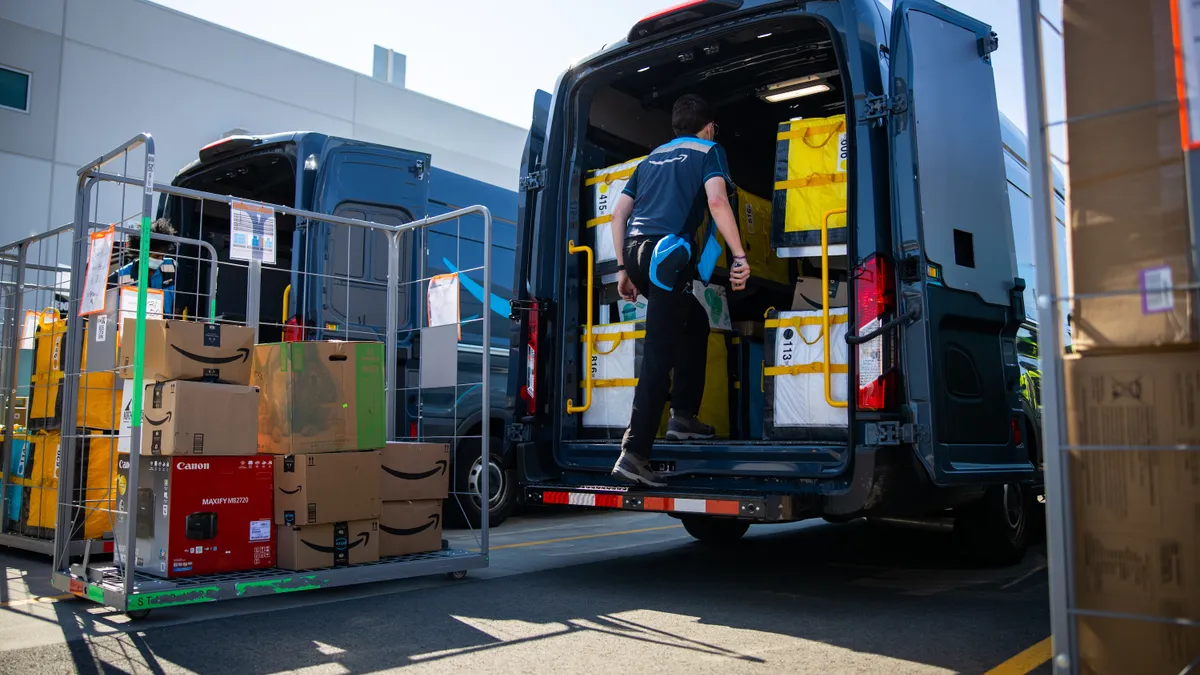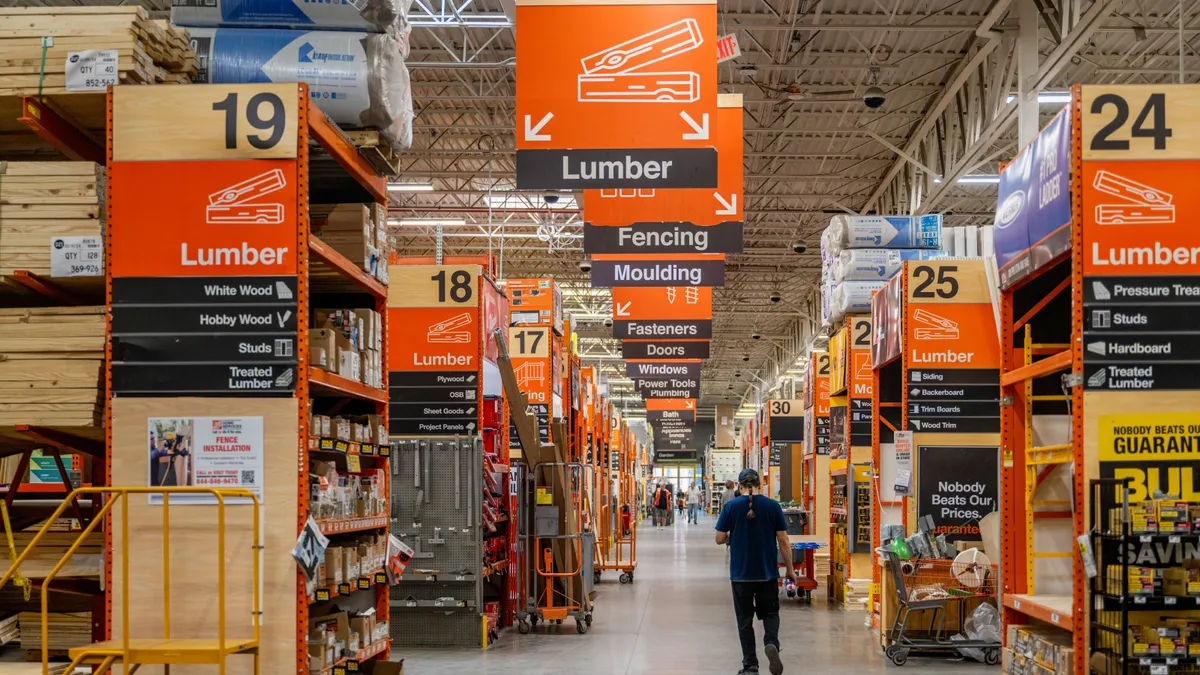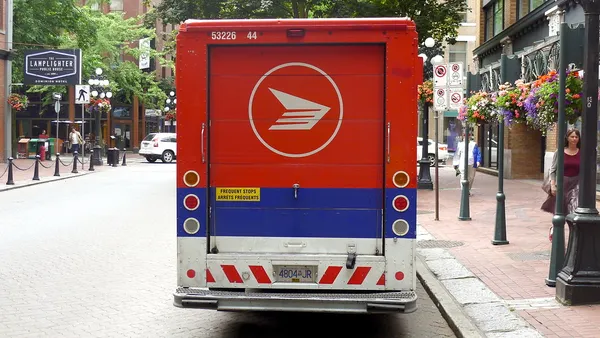Logistics companies love e-commerce. On earnings calls, executives speak about the growth in online sales as a greenfield opportunity for expansion in volume and revenue among the companies responsible for delivering packages.
Earlier this summer, FedEx CEO Fred Smith said the company saw online sales as an area for potential gains.
"We intend to substantially grow our e-commerce business and are well aware improved profitability in this market requires greater efficiency in delivering residential packages and we have sound initiatives to steadily improve our cost to serve this market," Smith said on the company's earnings call in June.
This might make last week's news of FedEx decision not to renew its ground contract with Amazon — the largest e-retailer — seem surprising. But the financial world was unfazed.
"We believe Amazon was one of FedEx’s least profitable customers on a margin basis, representing less than 1.3% of FedEx’s $69.7 billion of FY 19 revenue, the majority of it for FedEx Express rather than FedEx Ground," Jonathan Root, Moody’s senior vice president and lead FedEx analyst, said in a statement emailed to Supply Chain Dive.
First Express, now Ground
Root said it was "more of the same" following FedEx's decision to cut ties with Amazon earlier this summer on air deliveries. When Amazon made this air announcement in June, Moody's said it "makes sense" considering the expected growth in online sales in the retail sector, suggesting that FedEx could achieve better margins and return on investment by working with customers other than Amazon, according to a research note.
"While it will take time to fully replace the Amazon volumes with that from other customers, we nonetheless consider the news a credit positive event taking a longer-term perspective," Moody's wrote in June.
The parcel volume FedEx moved for Amazon was smaller on the ground compared to the air. About 80% of the volume between the two companies went through the U.S. air business, according to Morgan Stanley.
The ending of FedEx Ground's contract with Amazon last week did not seem to sour analyst sentiment toward FedEx.
Relying on Amazon for continued growth could be hard to sustain in the long-run because Amazon is increasingly investing in its own logistics network, meaning there could be increasingly less volume for third parties going forward, Morgan Stanley's note said.
While Amazon's growing logistics network could take volume away from 3PLs, Goldman Sachs still doesn't see it as a competitor to FedEx and UPS.
Below-average margins, limited financial impact
Amazon represented 1.3% of FedEx's total revenue. Morgan Stanley suggested the break will have a "relatively limited" near-term financial impact on FedEx. But the symbolic impact is more substantial — making the decision to end these big contracts with the biggest e-commerce retailer "would have been unthinkable" just five to seven years ago, Morgan Stanley said in a research note.
Amazon's size and pricing power mean FedEx could likely have been getting "below-company average margins" from its contact with the e-retailer.
FedEx will work to get a fair price for its capital and capacity, according to Mehrotra.
And the volume that Amazon gave FedEx might not have been quality business anyway, Deutsche Bank suggested in a research note last week.
"[W]e believe Amazon has been increasingly giving its 3rd party partners the lowest density and most unprofitable packages," Amit Mehrotra, a research analyst with Deutsche Bank, said in a research note last week. "For example, one anecdote we recently heard from a senior transportation and logistics executive was a FedEx truck driving 75 miles to make 1 Amazon package delivery to a rural destination; clearly this is unprofitable and unsustainable."
FedEx had already lowered its share of Amazon volume over the last few years and was carrying just 2% of Amazon's volume, Mehrotra wrote.
Amazon likely won't see a big hit as a result of the ended contract.
"We expect little impact to Amazon from this as in many ways this is an outcome of Amazon's multi-year investment and push to" build its own logistics operation, compete with 3PLs and better manage shipping cost, according to Morgan Stanley.
Amazon did not respond when asked what companies would handle the volume that had gone to FedEx Ground.
UPS to gain?
But there is a third company here that may see an impact as a result of Amazon and FedEx pumping the brakes on their business partnerships. Multiple analysts said UPS will likely benefit in the near term. After FedEx and Amazon ended their air contract, UPS saw next day air volume increase by 30% in the second quarter compared to the previous year, according to Mehrotra.
"UPS needs to be careful, in our opinion, with a demonstrable track record of transportation and logistics companies that lean into Amazon usually regretting the decision (initial volumes are attractive, but come with heavy price discounts and can [and are usually] taken away abruptly)," Mehrotra wrote.
"UPS continues to provide innovative solutions to all of our customers to help them grow and succeed," a UPS spokesperson told Supply Chain Dive. "We don’t comment on any specific customer discussions or the details of our contractual relationships."
It could take FedEx a while to make up for the volume it will lose as a result of this decision. But it is confident that recent changes to its Ground operation will bring a bump in business. And Wall Street seems to buy it.
"[W]e still see significant runway for growth in both volumes and profitability over the next few years, even without Amazon," a Goldman Sachs research note last week said of FedEx without Amazon.




















